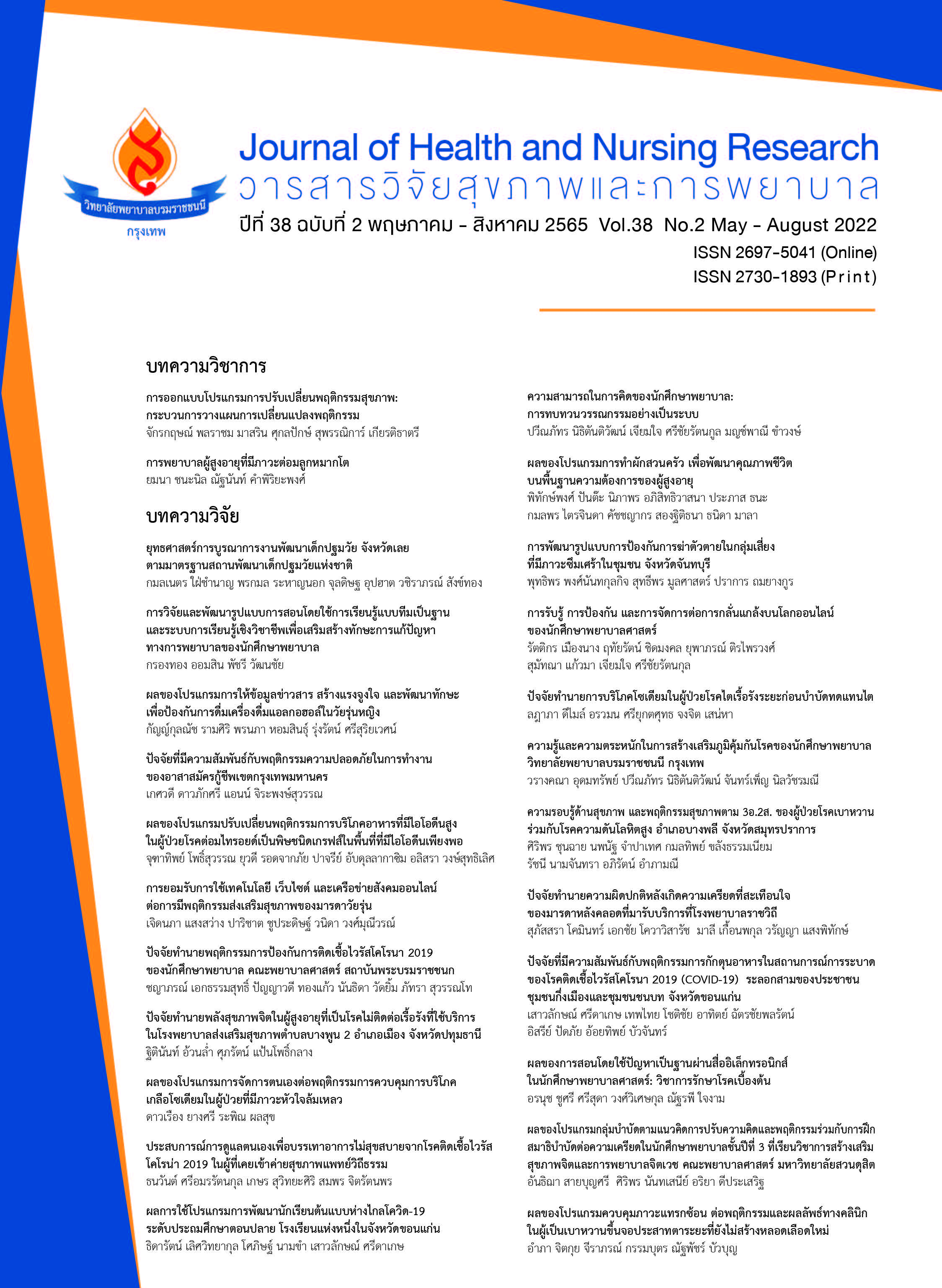ผลของโปรแกรมการทำผักสวนครัว เพื่อพัฒนาคุณภาพชีวิตบนพื้นฐานความต้องการของผู้สูงอายุ
คำสำคัญ:
โปรแกรมผักสวนครัว, คุณภาพชีวิต, ผู้สูงอายุบทคัดย่อ
บทนำ: ปัจจุบันผู้สูงอายุมีอายุยืนยาวขึ้น ส่งผลให้คุณภาพชีวิตของผู้สูงอายุลดลงจากปัจจัยหลายประการ การทำสวนครัวถือเป็นกิจกรรมที่ช่วยรักษาและฟื้นฟูร่างกายและจิตใจของผู้สูงอายุในชุมชนได้
วัตถุประสงค์: เพื่อประเมินประสิทธิผลของโปรแกรมการทำผักสวนครัวในการพัฒนาคุณภาพชีวิตบนพื้นฐานความต้องการของสูงอายุ
ระเบียบวิธีวิจัย: การวิจัยนี้เป็นการวิจัยกึ่งทดลอง โดยเปรียบเทียบสองกลุ่ม คือ กลุ่มทดลองและกลุ่มควบคุม วัด 2 ครั้ง ก่อนเริ่มกิจกรรมสัปดาห์ที่ 8 หลังการทำกิจกรมเสร็จสิ้น กลุ่มตัวอย่างประกอบด้วย ผู้ที่มีอายุระหว่าง 60 – 80 ปี ที่อาศัยอยู่ในอำเภอเชียงกลาง จังหวัดน่าน จำนวน 108 คน ผู้วิจัยสุ่มแบบเจาะจง(Purposive Sampling) เพื่อคัดเข้ากลุ่มทดลอง และกลุ่มควบคุม กลุ่มละ 54 คน โดยกลุ่มทดลองจะได้รับโปรแกรมทำผักสวนครัว (Home grown vegetable, HGV.) ส่วนกลุ่มควบคุมจะใช้ชีวิตตามปกติ เก็บรวบรวมข้อมูลโดยใช้แบบสัมภาษณ์ข้อมูลส่วนบุคคลและแบบวัดคุณภาพชีวิตฉบับย่อ ชุดภาษาไทย (WHOQOL-BREF-THAI) วิเคราะห์ข้อมูลด้วยสถิติเชิงพรรณนา,independent sample t–test
ผลการวิจัย: ค่าคะแนนระดับคุณภาพชีวิตของผู้สูงอายุหลังสิ้นสุดโปรแกรม พบว่า ระหว่างกลุ่มทดลองและกลุ่มควบคุมมีความแตกต่างกันอย่างมีนัยสำคัญทางสถิติ (t = 3.282, p-value <0.001 ) โดยกลุ่มทดลองมีค่าคะแนนเฉลี่ยโดยรวมของระดับคุณภาพชีวิตสูงกว่ากลุ่มควบคุม (ร้อยละ 96.04, 91.33) เมื่อนำกลุ่มทดลองมาเปรียบเทียบคุณภาพชีวิตรายด้าน พบว่า หลังสิ้นสุดโปรแกรมระดับคะแนนคุณภาพชีวิตเพิ่มขึ้นทั้ง 4 ด้าน
สรุปผล: โปรแกรมการทำผักสวนครัวมีประสิทธิผลต่อการในการพัฒนาคุณภาพชีวิตของผู้สูงอายุในชุมชนให้ดีขึ้นได้
ข้อเสนอแนะ: องค์กรปกครองส่วนท้องถิ่นควรผลักดันให้มีการนำกิจกรรมในโปรแกรมทำสวนผักไปเป็นนโยบายของชุมชนในการส่งเสริมคุณภาพชีวิตของผู้สูงอายุ ตลอดจนนำไปขยายผลใช้กับกลุ่มอื่นๆ ต่อไป
Downloads
เอกสารอ้างอิง
United Nation Ageing. International Day of Older Persons. [Internet]. 2018 [cited 2022 Jan 10].Available from: https://www.un.org/en/global-issues/ageing.
Siriphanich B. Situation of The Thai Elderly. Foundation of Thai Gerontology Research and development Institute (TGRI). Institute for Population and Social Research, Mahidol University. [Internet]. 2019 [cited 2022 Jan 10]; Available from: https://www.dop.go.th/download/knowledge/th1610945020-322_0.pdf.(in Thai).
Hongthong D, Somrongthong R, R Ward P., Factors Influencing the Quality of Life (Qol.) Among Thai Older People in a Rural Area of Thailand. Iranian Journal of Public Health. [Internet]. 2015 [cited 2022 Jan 10]; 44(4): 479-85. Available from: https://pubmed.ncbi.nlm.nih.gov/26056666/.
Arterburn, D.E., P.K. Crane, and S.D. Sullivan. The coming epidemic of obesity in elderly Americans. J. Amer. Geriatr. Soc.2004; 52: 1907–12.
Nan Provincial Community Development Office.Report on the quality of life of people in Nan Province Information for basic need 2018. (in Thai).
Statistical office Nan.Nan Province Situation Analysis Report 2019. [Internet]. [cited 2022 Feb]. Available from: https://www. http://osthailand.nic.go.th/masterplan_area/userfiles/file%20Download/Report%20Analysis%20Province. (in Thai).
Masahiro T. Horticultural therapy in Japan -History, Education, Character, Assessment. University of Hyogo. JAPAN, JAD June 2019;2.
Victoria, E. Melody, Oliver. El-Shadan, T. The development of a model of community garden benefits to wellbeing. Elsevier. Preventive Medicine Reports 2016;(3):348-52.
Robert, M. and Tim, H. Hanstad. Small home garden plots and sustainable livelihoods for the poor. Research Gate. 2004.
Candace, A-S. and Alice, C CTRS. Why Do Older Adults Garden? ResearchGate.2005.
Dilrukshi, H. Russell, F. and Karim, M. Home gardens: a promising approach to enhance household food security and wellbeing. Agriculture & Food Security 2013; 2: 8. Available from: http://www.agricultureandfoodsecurity.com/content/2/1/8
Jacob, C. Statistical Power Analysis for the Behavioral Sciences Secon Edition Department of Psychology New York University, New York.1988.
Mahatnirunkul S,Tantipiwattanaskul S., Pumpaisalchai W, Wongsuwan K, Prommanajirangkul W.Comparison of the WHOQOL-100 and the WHOQOL-BREF (26 items).Journal of Mental Health Thailand.1998;5:4-15.(in Thai).
Nieman, D.C.. Exercise testing and prescription – A health related approach. Sydney : McGraw-Hill.2003.
Loan, V. and Vicki, B. The Effect of Community Gardens on Neighboring Property Values. REAL ESTATE ECONOMICS. in SSRN Electronic Journal January 2007; DOI: 10.2139/ssrn.889113. 2007;36(2):241–83.
Paulo, N. Benedita, C. lisabete, P. and Margarida, S.. Growing Health and Quality of Life: Benefits of Urban Organic Community Gardens. Journal of Nutritional Health & Food Science. March 2018;6(1):1-7.DOI: 10.15226/jnhfs.2018.001124.
Mark, B. & Andrew,C. (2004).Home, the Culture of Nature and Meanings of Gardens in Late Modernity. Housing Studies,19(1):000–000.
M.R. Rao and B.R. Rajeswa Rao.Tropical Homegardens: A Time-tested Example of Sustainable Agroforestry, Springer. Printed in the Netlterlands.2006:205-32.
Wakefield, S.Yeudall, F. Taron, C. Reynolds, J. and Skinner, A. Growing urban health: Community gardening in South-East Toronto. Health Promotion International, 2007;22(2):92-101.
Andrew, M. Michael, K. and Ide, M..Horticultural Therapy Program for People with Mental Illness: A Mixed‐Method Evaluation. International. Journal of Environmental Research and Public Health 2020;17:711.DOI:10.3390/ijerph17030711.
Noelle, C. Community Gardening, Motivation and Health Benefits. Technological University Dublin.2011.
Theresa, L. Barbara, M. and Nancy, A. Positive aging benefits of home and community gardening activities: Older adults report enhanced self-esteem, productive endeavours, social engagement and exercise. SAGE Open Medicine. 2020; 8:1.
Marion, T. Ashby, S. Marlene, P.Chantal, S. Caroline, M. Jill, L. and Nicole, D..Impact of community gardening on lifestyles' sustainability: quantitative & qualitative evaluation of a natural experiment. Research Square.2020.
Daisuke, M.. Relationship between Community or Home Gardening and Health of the Elderly: A Web-Based Cross-Sectional Survey in Japan. International Journal Environment Research and Public Health. 2019 Apr 17;16(8):1389. DOI:10.3390/ijerph16081389.
Agnes, E. van den, B. and Mariëtte,H.G.C.. Gardening promotes Neuroendocrine and Affective Restoration from Stress. The journal of health Psychology.2010[Internet].[cited 2022 Jan 10]; Available from: DOI:10.1177/1359105310365577.
Michelle, H. Alison, B. Michael, H. and Michell, M.. What is the evidence for the impact of gardens and gardening on health and well-being: a scoping review and evidence-based logic model to guide healthcare strategy decision making on the use of gardening approaches as a social prescription.BMJ. Open access. 2020.
Mark,B. D. Taral, S.Jonna, G.D, Pamela, F. M.Sandra, L. Jack, C. Amara S. C. Mary, H. and Kye Y. K.. What Is the Evidence to Support the Use of Therapeutic Gardens for the Elderly. Korean Neuropsychiatric Association. International Psychiatry Investigation. doi: 10.4306/pi.2012.9.2.100. Source: PubMed. 2012.
Donna W, Allen G. Being Grounded: Benefits of Gardening for Older Adults in Low-Income Housing.Journal of Housing for the eldrly,2013;27:28-104.
Hiroharu, K. Kiichiro, T. Minoru, Y. Hyuntae, P. Hiroyasu, O. Takuya, et al. Effectiveness of horticultural therapy: a systematic review of randomized controlled trials. Complementary Therapies in Medicine, 2014;22(5):930-43.
ดาวน์โหลด
เผยแพร่แล้ว
รูปแบบการอ้างอิง
ฉบับ
ประเภทบทความ
สัญญาอนุญาต
ลิขสิทธิ์ (c) 2022 วารสารวิจัยสุขภาพและการพยาบาล (วารสารวิทยาลัยพยาบาลบรมราชชนนี กรุงเทพ)

อนุญาตภายใต้เงื่อนไข Creative Commons Attribution-NonCommercial 4.0 International License.
บทความที่ได้รับการตีพิมพ์ เป็นลิขสิทธิ์ของวารสารวิจัยสุขภาพและการพยาบาล (วิทยาลัยพยาบาลบรมราชชนนี กรุงเทพ) ไม่สามารถนำไปตีพิมพ์ซ้ำในวารสารฉบับอื่น


















